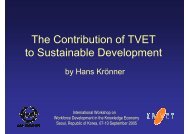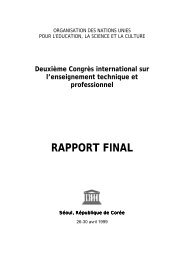Learning for Life, Work and the Future Initial ... - Unesco-Unevoc
Learning for Life, Work and the Future Initial ... - Unesco-Unevoc
Learning for Life, Work and the Future Initial ... - Unesco-Unevoc
You also want an ePaper? Increase the reach of your titles
YUMPU automatically turns print PDFs into web optimized ePapers that Google loves.
<strong>Learning</strong> <strong>for</strong> <strong>Life</strong>, <strong>Work</strong> <strong>and</strong> <strong>the</strong> <strong>Future</strong> Participants’ Papers Page 59<br />
We should remain committed to <strong>the</strong> spirit, articles <strong>and</strong><br />
goals of <strong>the</strong> OAU Decade of Education in Africa, <strong>the</strong><br />
Jomtien Declaration, <strong>the</strong> Harare Declaration <strong>and</strong> <strong>the</strong><br />
SADC Protocol on Education <strong>and</strong> Training. We<br />
should continue to encourage <strong>and</strong> be active participants<br />
in <strong>the</strong> joint initiatives to improve education in <strong>the</strong><br />
African continent. We need to stimulate <strong>and</strong> seek new<br />
partnerships in <strong>the</strong> fight against illiteracy, disease<br />
(especially HIV/AIDS), poverty <strong>and</strong> hunger.<br />
References<br />
Litabe R. M., (1995), Technical <strong>and</strong> Vocational Education<br />
<strong>and</strong> Training - The case of Lesotho, M. Ed<br />
unpublished dissertation, University of Manchester,<br />
Manchester, United Kingdom<br />
Vladimir Gasskov, (2000), Managing Vocational Training<br />
Systems. A H<strong>and</strong>book <strong>for</strong> Senior Administrators,<br />
ILO, Geneva<br />
SADC, (1997), Protocol on Education <strong>and</strong> Training,<br />
Blantyre, Malawi<br />
KRIVET, (1999), 1998 Research Abstracts, Seoul, Korea<br />
KRIVET, (1999), Technical <strong>and</strong> Vocational Education <strong>and</strong><br />
Training in Korea, Seoul, Republic of Korea<br />
bmb+f, (1999), Second International Congress on Technical<br />
<strong>and</strong> Vocational Education: Documents presented by<br />
<strong>the</strong> delegation of <strong>the</strong> Federal Republic of Germany<br />
in Seoul, Republic of Korea, 26 to 30 April 1999,<br />
Bonn, Germany<br />
14 MAHUBE, Bester (Botswana): Quality of TVET<br />
Appropriateness of TVET Programmes to <strong>the</strong><br />
Botswana Economy<br />
The issue of <strong>the</strong> quality of Technical <strong>and</strong> Vocational<br />
Education <strong>and</strong> Training (TVET) programmes is pertinent<br />
to <strong>the</strong> success of <strong>the</strong> Government of Botswana’s<br />
goal of achieving sustainable economic diversification<br />
in <strong>the</strong> National Development Plan Eight (NDP8) <strong>and</strong><br />
beyond. It is <strong>the</strong>re<strong>for</strong>e imperative that our TVET<br />
institutions should always strive to ensure <strong>the</strong> provision<br />
of <strong>the</strong> best possible technical skills through consistent<br />
facilitation of quality training programmes in order to<br />
improve <strong>and</strong> enhance <strong>the</strong> quality of life of Batswana as<br />
well as creating sustainable economic development.<br />
This paper will <strong>the</strong>re<strong>for</strong>e focus on <strong>the</strong> quality of skills<br />
offered by Brigades. Brigades are among <strong>the</strong> main<br />
providers of technical <strong>and</strong> vocational training in<br />
Botswana. At present <strong>the</strong>y offer training in more than<br />
fourteen different vocations. An important feature of<br />
<strong>the</strong> Brigades’ training programmes is <strong>the</strong> concept of<br />
Training with Production which was introduced by <strong>the</strong><br />
founder of <strong>the</strong> Brigade movement Patrick Van Rensburg<br />
in 1965 at Serowe’s Swaneng Hill School. This<br />
Training with Production programme offers trainees an<br />
all-round package of <strong>the</strong>oretical lessons, practicals <strong>and</strong><br />
on-<strong>the</strong>-job training.<br />
The training offered by <strong>the</strong> Brigades is perceived to be<br />
of poor quality. This view is held by people who have<br />
had very little contact with Brigades graduates, <strong>and</strong><br />
continues to prevail because initially <strong>the</strong> Brigades<br />
admitted primary school dropouts because of <strong>the</strong><br />
shortage of secondary school places at that time. The<br />
situation has since changed with <strong>the</strong> introduction of<br />
nine <strong>and</strong> later ten years of basic education <strong>for</strong> all<br />
school-going children. Those who enrol in Brigades<br />
are now Junior Certificate holders <strong>and</strong> some “O” level<br />
certificate holders who fail to be admitted to tertiary<br />
institutions.<br />
The best judges of <strong>the</strong> quality of such training are <strong>the</strong><br />
employers in <strong>the</strong>ir various <strong>for</strong>ms who can state <strong>the</strong><br />
level at which <strong>the</strong>y rate brigade graduates as against<br />
those from o<strong>the</strong>r institutions.<br />
Brigades have failed to dispel this ‘poor quality’<br />
perception over <strong>the</strong>ir many years of existence, mainly<br />
due to lack of financial resources to engage public<br />
relations officers to project <strong>and</strong> promote <strong>the</strong>ir good<br />
image, or even to commission consultancies to<br />
determine <strong>the</strong> extent of <strong>the</strong>ir skills contribution to <strong>the</strong><br />
national labour market.<br />
The Department of Vocational Education <strong>and</strong> Training<br />
(DVET) which took over <strong>the</strong> functions of <strong>the</strong> <strong>for</strong>mer<br />
Brigades Development Centre (BRIDEC), has not<br />
helped <strong>the</strong> Brigades to shed this stigma, largely<br />
because DVET tends to focus more on Vocational<br />
Training Centres (VTCs) which are 100% government<br />
owned. The recent name change of VTC to Technical<br />
Colleges (TCs) will fur<strong>the</strong>r polarise <strong>the</strong> two institutions,<br />
as a perception of superiority will now be<br />
attached to TCs − a view that will continue despite <strong>the</strong><br />
fact that both institutions require <strong>the</strong> same entry<br />
qualifications, which are predominantly a Junior<br />
Certificate in construction trades <strong>and</strong> “O” level in<br />
mechanical <strong>and</strong> business studies.<br />
The 1995 Tracer <strong>and</strong> Evaluation Study of Botswana<br />
Brigades by N. H. Fidzani <strong>and</strong> L. Mafela of <strong>the</strong> University<br />
of Botswana stated that “in spite of <strong>the</strong> current<br />
problems experienced by <strong>the</strong> construction industry, <strong>the</strong><br />
study found out that <strong>the</strong> majority of <strong>the</strong> graduates who<br />
completed between 1989 <strong>and</strong> 1991 still hold <strong>the</strong>ir<br />
jobs”. The researchers interpreted <strong>the</strong> above to mean<br />
that <strong>the</strong> Brigades graduates had survived <strong>the</strong> retrenchments<br />
<strong>and</strong> were <strong>the</strong>re<strong>for</strong>e per<strong>for</strong>ming well in <strong>the</strong> job<br />
market. That was fur<strong>the</strong>r taken to mean that Brigades<br />
graduates are able to secure good jobs <strong>and</strong> that <strong>the</strong>y are<br />
not easily affected by <strong>the</strong> ups <strong>and</strong> downs of <strong>the</strong> labour<br />
market. The researchers also established that <strong>the</strong>y





